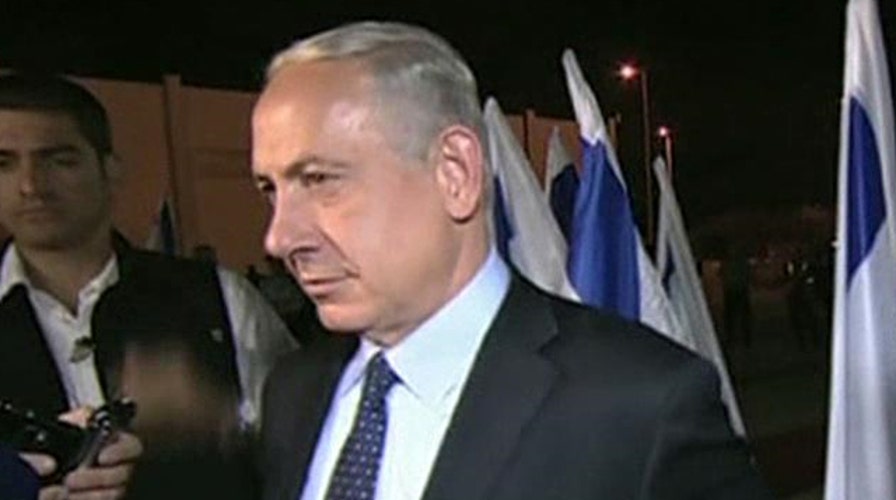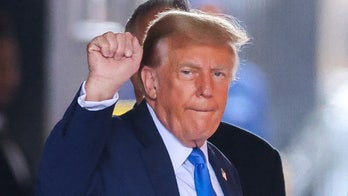A wary Israeli Prime Minister Benjamin Netanyahu cautioned the U.S. not to let up on sanctions against Iran, during an in-person meeting on Monday with President Obama just days after the U.S. president held a historic phone call with Iran's Hassan Rouhani. Israel has panned Rouhani's latest diplomatic push as a "smiley campaign."
The Obama-Rouhani phone call was the first between an American and Iranian president since the Iranian revolution of 1979, which sent U.S.-Iranian relations into a deep freeze.
Western officials saw Rouhani's remarks before the U.N. General Assembly last week as conciliatory in tone, and Secretary of State John Kerry has begun working with other diplomats to potentially re-launch talks over Iran's nuclear program.
But, visiting the White House on Monday, Netanyahu said Iran's "conciliatory words" have not yet been met by "real action."
Saying that the threat of military action and the pressure of sanctions brought Iran to this point, Netanyahu said: "I also believe that if diplomacy is to work, those pressures must be kept in place. And I think they should not be lessened until there is verifiable success."
Further, Israel's leader said that sanctions should be strengthened if Iran continues to advance its nuclear program during talks.
Obama, sitting beside Netanyahu, agreed that "words are not sufficient" and western leaders need to see "actions."
He said it is "imperative" that Iran not possess a nuclear weapon, and added: "We have to test diplomacy."
He pledged to stay in "close consultation" with Israel.
Israeli leaders watched with dismay what they derisively call the "smiley campaign" by Iran's new president last week. Rouhani delivered a conciliatory speech at the United Nations in which he repeated Iran's official position that it has no intention of building a nuclear weapon and declared his readiness for new negotiations with the West.
Netanyahu, who contends Iran is using the gestures as a smoke screen to conceal an unabated march toward a nuclear bomb, said before boarding his flight to the U.S. that: "I will tell the truth in the face of the sweet talk and the onslaught of smiles."
Netanyahu also planned to offer up fresh intelligence in his attempt to persuade the U.S. to maintain tough economic sanctions and not allow the Islamic republic to develop a bomb or even move closer to becoming a nuclear threshold state.
Capping off Rouhani's visit last week, Rouhani and Obama held a 15-minute phone call as the Iranian leader was traveling to the airport. By the end of the call, Obama was suggesting that a breakthrough on the nuclear issue could portend even deeper ties between the U.S. and Iran. U.S. and European diplomats hailed a "very significant shift" in Iran's attitude and tone.
After the week's developments, Kerry said an agreement on Iran's nuclear program could come in a matter of months if Iran came to the table in good faith.
"If it is a peaceful program, and we can all see that, the whole world sees that, the relationship with Iran can change dramatically for the better and it can change fast," Kerry said on CBS' "60 Minutes" Sunday.
For years, Netanyahu has warned that Iran is steadily marching toward development of nuclear weapons, an assessment that is widely shared by the West because of Iran's continued enrichment of uranium and its run-ins with international nuclear inspectors.
The Israeli prime minister contends Rouhani's outreach is a ploy to ease international sanctions and buy time. Iran says its nuclear program is for peaceful purposes only.
Israel considers a nuclear-armed Iran an unacceptable threat, given repeated Iranian assertions that the Jewish state should not exist. Israel has a long list of other grievances against Iran, citing its support for hostile Arab militant groups, its development of long-range missiles and alleged Iranian involvement in attacks on Israeli targets in Europe and Asia.
On Sunday, Israel announced the arrest of a Belgian-Iranian businessman on espionage charges.
Netanyahu appears to enjoy widespread domestic support for his tough approach. Israel's Channel 10 TV released the results of a poll Sunday night showing that 78 percent of respondents don't believe Iran wants to resolve the nuclear problem. Fifty-nine percent said they do not think the U.S. will reach an agreement with Iran, while just 29 percent said they expect a resolution. The station did not say how many people were questioned or provide a margin of error.
Over the years, Israel has issued shifting assessments of how close Iran is to producing a weapon. Last year, Netanyahu presented a cartoon diagram to the U.N. showing that Iran would enter the final phase of weapons production by mid-2013. Israel has since backed off that assessment.
Netanyahu's intelligence minister, Yuval Steinitz, said international pressure forced Iran to slow production.
While American officials are well aware of Israel's concerns, they say there are no plans to reverse the latest diplomatic push.
The Associated Press contributed to this report.





